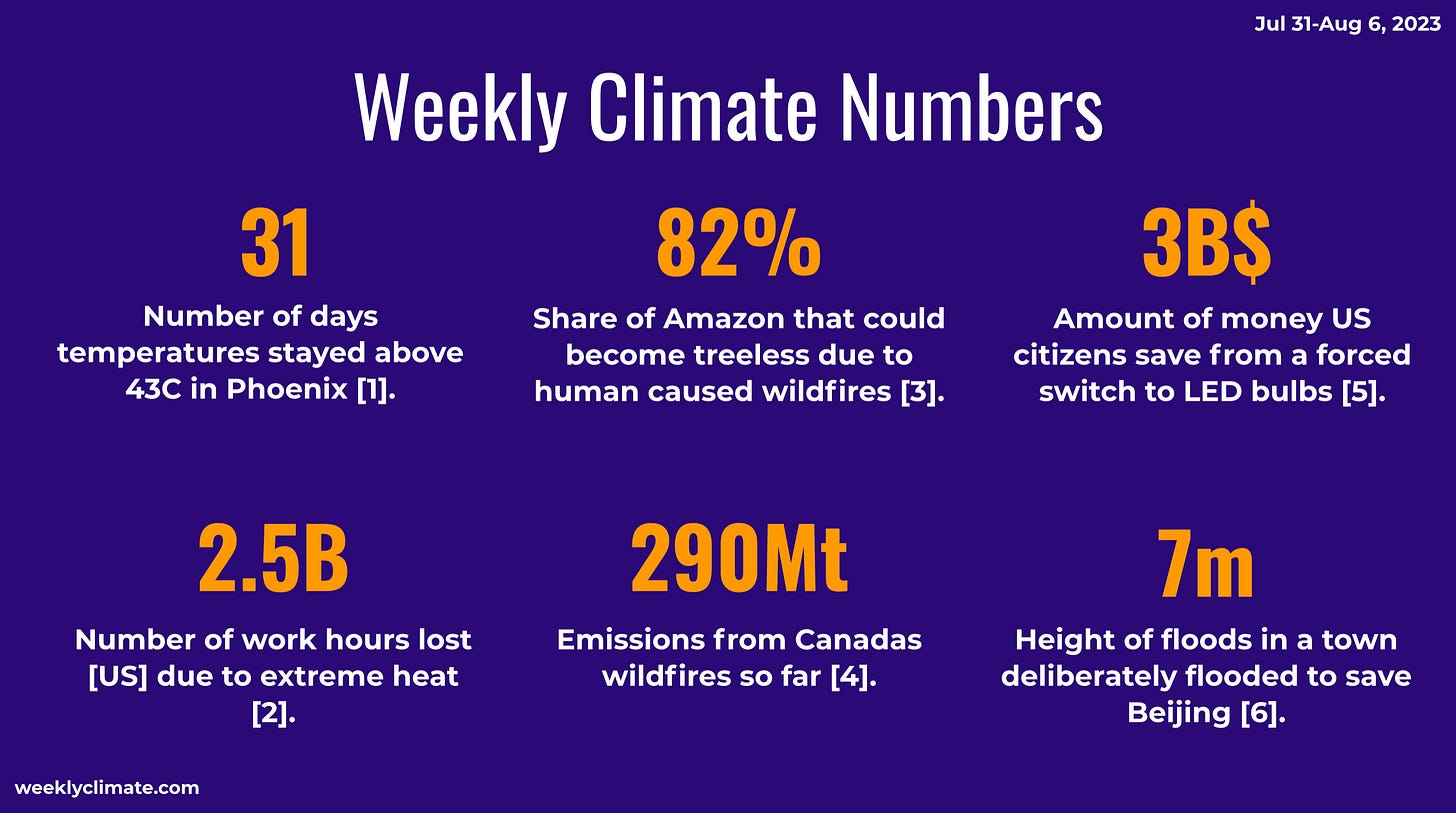[Jul 31-Aug 6’23] The Adaptation issue #1
Heat deaths doubled since 90s, clean air centers launched, recycling bias and a guy with a drone taking on the coal industry.
Welcome to this week’s edition of The Weekly Climate 🎉
References: [1], [2], [3], [4], [5] and [6].
With this many articles on adaptation I almost feel like I should change the focus of this newsletter to adaptation 😬. Once again, flooding and heat really occupied a lot of news this week.
‼️News you can’t miss
Here’s one important scary/bad (🙀), good (😻), interesting (😼) and fossil (💩) news item.
🙀 Heat deaths among workers doubled since 1990s
😻 Clean air centers are being launched in West US to help people deal with wildfire smoke
💩 Inspiring story about a guy and his drone trying to take down the coal industry
👩⚕️ Status: Climate & Science
Let’s look at how we’re doing this week!
[#wildire] — Scientists at the Department of Energy’s Oak Ridge National Laboratory are studying the risks and impacts of wildfires, including the effects on the carbon cycle and biodiversity. Their work includes developing a framework for forest-thinning practices, studying the effects of repeated wildfires on the carbon cycle, and refining large-scale simulations of the Earth’s climate to better represent different forms of carbon resulting from wildfires. The scientists have also launched a Fire Community Database Network to encourage scientists and land managers to submit environmental data on burned areas to a central repository.
📰 The 7 Grand Challenges
⚡️Decarbonize Electricity
Clean electricity is the one do-or-die challenge we must solve.
[#NZhydro] — Record rainfall in New Zealand has helped to push renewable energy use to the country's highest level in decades, resulting in a decline in national greenhouse gas emissions. However, climate scientists have cautioned against placing too much optimism in the decrease driven by hydropower, given the sector's dependence on high volumes of rain that may reverse with dry conditions borne by the El Niño pattern forecast for summer 2023. The government has a 2050 target to reach net zero for long-lived greenhouse gas emissions and a reduction in biogenic methane emissions, and has established a number of climate change initiatives to support this goal.
[#USwind] — A new report by the University of California, Berkeley shows that the US has the potential to generate up to a quarter of its electricity from offshore wind by 2050, which could help meet global climate goals. However, the US currently has very little offshore wind capacity installed, and the industry is facing political and financial challenges. To meet demand and hit climate goals, the US needs to add 27 GW of offshore wind and 85 GW of land-based wind and solar each year between 2035 and 2050.
🏘 Reduce impact of urban and rural areas
Lowering the impact of urban and rural areas.
[#recycling] — A new study published in Nature Sustainability suggests that the emphasis on recycling has distracted us from better options for preventing waste. The study revealed widespread confusion about the relative usefulness of recycling, with many people not knowing how to recycle correctly. Recycling is a useful tool, but its usefulness has been blown out of proportion, and we need to be more intentional with the goods we consume and the actions we take, while also putting that onus back on the producers.
[#USbulbban] — New energy efficiency rules in the United States require light bulbs to meet a minimum standard of producing 45 lumens per watt, effectively banning most incandescent bulbs. LED lights, which have already transformed America’s energy landscape, will take their place. The Department of Energy expects Americans to collectively save nearly $3 billion a year on their utility bills, and the rules will also cut carbon dioxide emissions by 222 million metric tons over the next three decades. The shift from traditional incandescent bulbs to LED lights brings to a close a political debate that once was a Republican rallying point.



